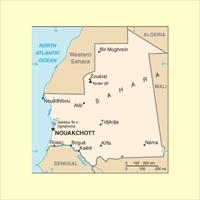MAURITANIA: Coup members face one-month sanctions ultimatum

Following a meeting between Mauritania’s junta leaders and the European Union in Paris, EU officials have given the military officials one month to show how they will restore constitutional order, or sanctions will take effect. Coup leaders – who have refused to release President Sidi Mohammed Cheikh Ould Abdallahi – and donors are entering their 10th week of a sanctions standoff. At stake is about US$500 million in development and military assistance.
Included in that sum is $175 million from the World Bank, which includes $9 million in humanitarian aid, budgeted for 17 programmes affecting Mauritanians.
“Media-created democracy”
Mohamed Vall Ould Bellal – former minister of foreign affairs under the 2005-deposed President Maaouya Ould Taya and now Mauritanian ambassador to Senegal – told IRIN sanctions would not “strong-arm” a quick return to constitutional order, but rather, would be the “quickest way to plunge Mauritania into chaos.”
“The west [donors] wanted us to be a model democracy that they could hold up as their success in the Arab world – ‘Look, Arabs can vote too’. But what are elections? It is one day,” said Bellal. “You cannot overnight change a tribalistic society where family ties dominate. Just because we held elections, and now there is a coup, people think it’s a travesty against a ‘fledgling democracy.’ But it was a media-created democracy, with [US-based television network] CNN televised debates that had no meaning beyond the length of the debate.”
Bellal said it was current coup leaders who recruited the now-detained president to run and helped to ensure his victory. “Election observers chose to look the other way and ignore the fact that our donor-funded democracy was just the military wearing a democratic disguise.”
Democracy nonetheless
But Mohamed Mahmoud Ould Dahmane with the fractious governing National Party for Democracy and Development (PNDD) told IRIN no matter who supported Abdallahi’s 2007 election win, he nonetheless won a free and fair election.
“Every candidate had someone’s support. He was democratically-elected. And his detention is unacceptable,” said Dahmane.
On 7 July, 48 members of the governing party resigned in protest of an Abdallahi-led government reshuffling two months earlier.
Dahmane added that sanctions to force the president’s release can be “disastrous” over the long term: “That is really the last resort. Better to apply pressure against the coup leaders personally, rather than take broad actions that will affect all Mauritanians.”
On 17 October, the United States issued travel restrictions for coup leaders and their supporters, calling for the president’s release.
Mauritanian ambassador Bellal said rather than threatening sanctions, rich countries can exert their influence in other ways. “Why punish a child that is learning how to walk? Mauritania has been under military rule its entire statehood and has weak institutions. Rather than coming in and telling us that women and men have to be equal, and what our parliament must look like to conform to western ideals of democracy – on other countries’ timetables – then slapping sanctions when we stumble, why don’t well-meaning donors help us create the conditions for democracy?”
Coup leader Mohamed Ould Abdel Aziz has called for an election referendum, which anti-coup parties have pledged to boycott.
At the close of the Paris meeting on 20 October, Mauritanian state media reported that the post-coup prime minister, Moulaye Ould Mohamed Laghdhaf, said coup leaders are open to everything except the return of President Abdallahi to power.
 Back and Next - Back and Next
Back and Next - Back and Next See Also - See Also
See Also - See Also